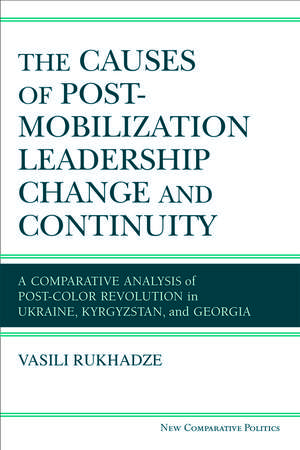The Causes of Post-Mobilization Leadership Change and Continuity: A Comparative Analysis of Post-Color Revolution in Ukraine, Kyrgyzstan, and Georgia: New Comparative Politics
Autor Vasili Rukhadze Ph.D.en Limba Engleză Hardback – 23 aug 2021
Vasili Rukhadze examines the factors that contributed to post-uprising leadership durability in the Ukraine, Kyrgyzstan, and Georgia in 2004–12, after these countries underwent their so-called “Color Revolutions.” Using structured, focused comparison and process tracing, he argues that the key independent variable influencing post-mobilization leadership durability is ruling coalition size and cohesion. He demonstrates that if the ruling coalitions are large and fragmented, as in the Ukraine and Kyrgyzstan, the coalitions disintegrate, thus facilitating the downfall of the governments. Alternatively, if the ruling coalition is small and cohesive, as in Georgia, the coalition maintains unity, hence helping the government to stay in power.
This study advances the debate on regime changes. By drawing a clear distinction between political leaderships that come to power as a result of popular uprisings and governments that take power through normal democratic processes, military coup, or any other means, the research offers one of the first studies on post-mobilization leadership. Rukhadze helps scholars differentiate between the factors that affect durability of post-uprising leadership from those factors that impact durability of all other political leadership, in turn equipping researchers with new tools to study power politics.
This study advances the debate on regime changes. By drawing a clear distinction between political leaderships that come to power as a result of popular uprisings and governments that take power through normal democratic processes, military coup, or any other means, the research offers one of the first studies on post-mobilization leadership. Rukhadze helps scholars differentiate between the factors that affect durability of post-uprising leadership from those factors that impact durability of all other political leadership, in turn equipping researchers with new tools to study power politics.
Preț: 449.97 lei
Preț vechi: 555.51 lei
-19% Nou
Puncte Express: 675
Preț estimativ în valută:
86.11€ • 88.19$ • 71.63£
86.11€ • 88.19$ • 71.63£
Carte indisponibilă temporar
Doresc să fiu notificat când acest titlu va fi disponibil:
Se trimite...
Preluare comenzi: 021 569.72.76
Specificații
ISBN-13: 9780472132652
ISBN-10: 0472132652
Pagini: 258
Ilustrații: 3 figures, 8 tables
Dimensiuni: 152 x 229 x 23 mm
Greutate: 0.45 kg
Editura: UNIVERSITY OF MICHIGAN PRESS
Colecția University of Michigan Press
Seria New Comparative Politics
ISBN-10: 0472132652
Pagini: 258
Ilustrații: 3 figures, 8 tables
Dimensiuni: 152 x 229 x 23 mm
Greutate: 0.45 kg
Editura: UNIVERSITY OF MICHIGAN PRESS
Colecția University of Michigan Press
Seria New Comparative Politics
Notă biografică
Vasili Rukhadze is Visiting Lecturer of Political Science at the University of Pittsburgh
Cuprins
TABLE OF CONTENTS
LIST OF TABLES AND FIGURES
AKNOWLEDGEMENTS
CHAPTERS
I. Introduction, Research Design, and Methodology, and Literature Review
II. Historical Background
III. The Case of Ukraine
IV. The Case of Kyrgyzstan
V. The Case of Georgia
VI. Conclusions
REFERENCES
LIST OF INTERVIEWEES
LIST OF TABLES AND FIGURES
AKNOWLEDGEMENTS
CHAPTERS
I. Introduction, Research Design, and Methodology, and Literature Review
II. Historical Background
III. The Case of Ukraine
IV. The Case of Kyrgyzstan
V. The Case of Georgia
VI. Conclusions
REFERENCES
LIST OF INTERVIEWEES
Descriere
Vasili Rukhadze examines the factors that contributed to post-uprising leadership durability in the Ukraine, Kyrgyzstan, and Georgia in 2004–12, after these countries underwent their so-called “Color Revolutions.” Using structured, focused comparison and process tracing, he argues that the key independent variable influencing post-mobilization leadership durability is ruling coalition size and cohesion. He demonstrates that if the ruling coalitions are large and fragmented, as in the Ukraine and Kyrgyzstan, the coalitions disintegrate, thus facilitating the downfall of the governments. Alternatively, if the ruling coalition is small and cohesive, as in Georgia, the coalition maintains unity, hence helping the government to stay in power.
This study advances the debate on regime changes. By drawing a clear distinction between political leaderships that come to power as a result of popular uprisings and governments that take power through normal democratic processes, military coup, or any other means, the research offers one of the first studies on post-mobilization leadership. Rukhadze helps scholars differentiate between the factors that affect durability of post-uprising leadership from those factors that impact durability of all other political leadership, in turn equipping researchers with new tools to study power politics.
This study advances the debate on regime changes. By drawing a clear distinction between political leaderships that come to power as a result of popular uprisings and governments that take power through normal democratic processes, military coup, or any other means, the research offers one of the first studies on post-mobilization leadership. Rukhadze helps scholars differentiate between the factors that affect durability of post-uprising leadership from those factors that impact durability of all other political leadership, in turn equipping researchers with new tools to study power politics.










